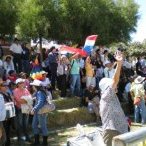English · Español

29 de abril de 2010 | Noticias | Justicia climática y energía
Pay Attention
Peoples´ Agreement reaches official climate negotiations
Descargar: MP3 (2.2 MB)
The Bolivian government submitted the Peoples´ Agreement reached in Cochabamba at the World Peoples´ Conference on Climate Change and the Rights of Mother Earth. The document points out that capitalism is the main cause of climate change. They also reject the “Copenhagen Accord” and highlight that industrialized countries have a climate debt that must be paid through transfer of technology and finance to the Global South.
The social movements also demand the creation of an International Climate and Environmental Justice Tribunal to “prevent, judge and penalize States, industries and people who contaminate or provoke climate change”, and consider that it is essential to carry out a global referendum to consult peoples on several issues related to this crisis.
Evo Morales´ administration stated that both the Peoples´ Agreement and the proposed “Universal Declaration on the Rights of Mother Earth” are fundamental for the United Nations Framework Convention on Climate Change.
The Peoples´ Agreement states that capitalism is the main cause of climate change and that we are confronting a “terminal crisis of a civilizing model that is patriarchal and based on the submission and destruction of human beings and nature”. “Humanity confronts a great dilemma: to continue on the path of capitalism, depredation, and death or to choose the path of harmony with nature and respect for life”, they state.
The social networks demand a new system to restore harmony with nature. “We propose the peoples of the world the recovery, revalorization, and strengthening of the knowledge, wisdom, and ancestral practices of Indigenous Peoples, which are reaffirmed in the concept of "Living Well”.
The proposed Universal Declaration on the Rights of Mother Earth includes the right to be respected, the right to regenerate its biocapacity and to continue its vital cycles and processes free from human alteration, the right to be free from contamination and pollution, free from toxic and
radioactive waste; and the right to be free from genetic modification, among other things.
Over 35 thousand people, coming from 140 countries, participated at the Conference in Cochabamba. There, they demanded developed countries to commit to emission reduction targets for the second commitment period of the Kyoto Protocol (2013-1017). They highlight that these reductions should reach at least 50 per cent compared to 1990 levels. The goal is to limit world temperature rise to 1°C. Social movements reject the attempts by a group of countries to abandon the Kyoto Protocol, the only binding instrument to reduce emissions.
The Agreement also states that developed countries should recognize and respect their climate debt. That is why they demand these countries to fund transfers of technology to developing countries, in addition to the costs of adaptation and mitigation to climate change in the Global South. They should also take responsibility for the millions of people forced to migrate due to this crisis.
The document also opposes market mechanisms, among them REDD (Reducing Emissions from Deforestation and Forest Degradation), which violates the sovereignty of the peoples.
Photo: Radio Mundo Real.








